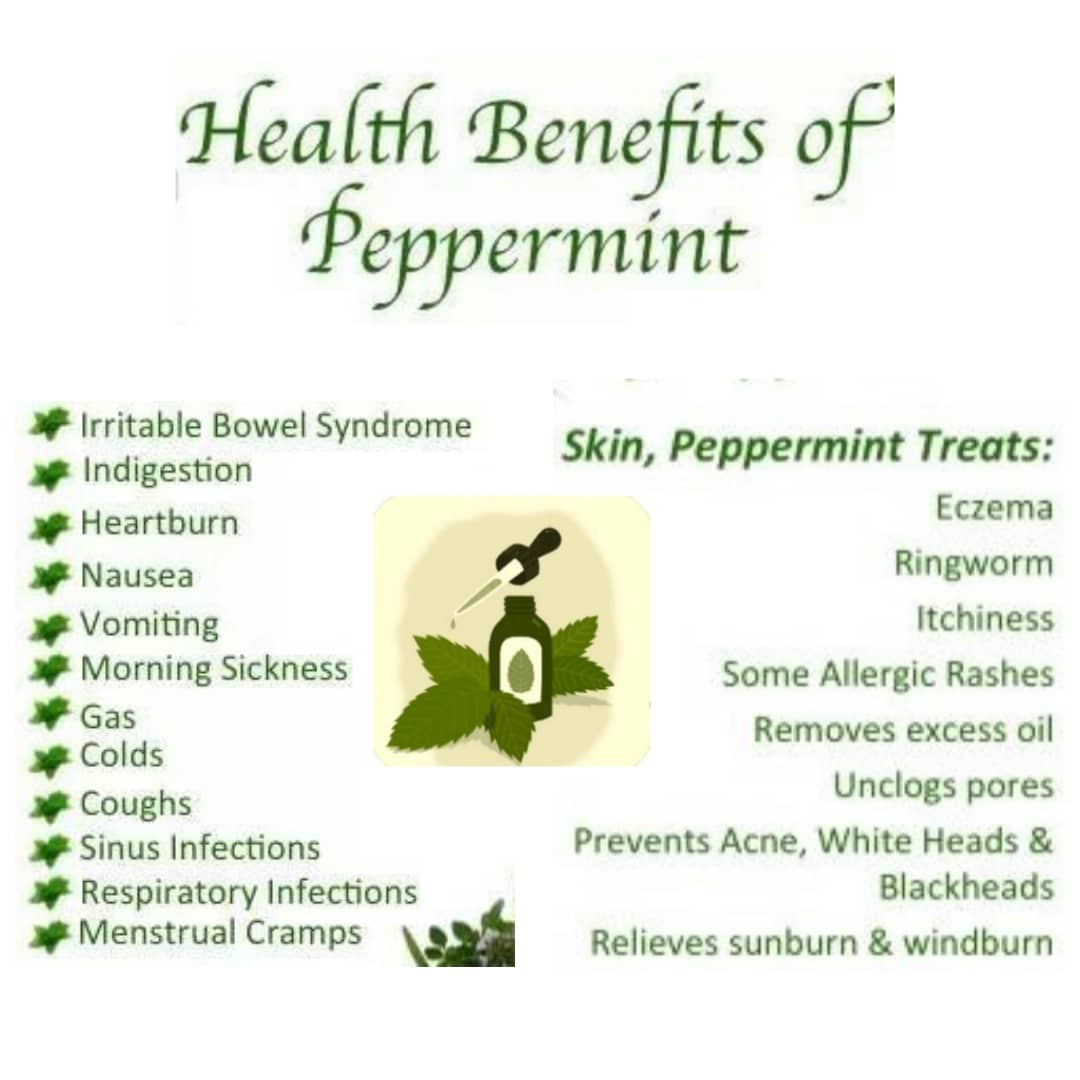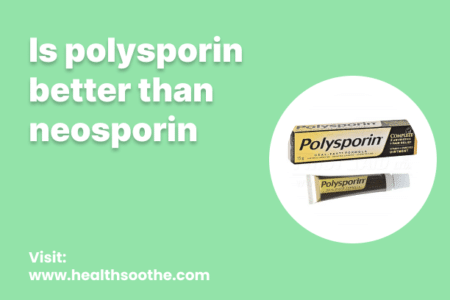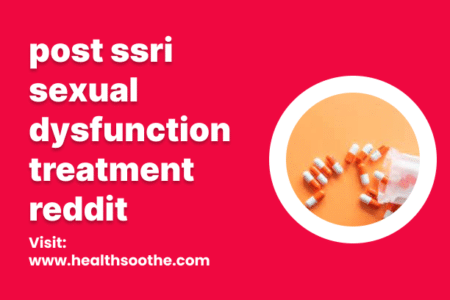Peppermint (Mentha piperita) is an aromatic herb in the mint family that is a cross between watermint and spearmint. Peppermint is a hybrid plant with numerous health benefits, and in this article, I am going to be telling you about the health benefits of Peppermint.
Peppermint can consist of fresh or dry leaves for use in food or as tea. Peppermint essential oil is used in tinctures, chest rubs, and creams, candies and breath mints.
It can also be taken in enteric-coated capsules for swallowing. This allows the peppermint to pass into the intestine. Peppermint essential oil is concentrated oil that is extracted from the peppermint plant by steam distillation. The completely fresh or partly dried plant is used before it starts to flower.
The chemical components of peppermint oil are:
- menthol
- menthone
- menthyl acetate
- 1,8-cineole
- limonene
- beta-pinene
- beta-caryophyllene
With these chemical components, the health benefits of Peppermint are sure so many.
Like other essential oils, peppermint essential oil should not be taken orally and must be diluted with a carrier oil before applying it to the skin. Peppermint is a popular traditional remedy for a number of conditions because of its numerous health benefits. It is believed to have calming effects.
It is used to treat flatulence, menstrual pains, diarrhoea, nausea, depression-related anxiety, muscle and nerve pain, the common cold, indigestion, and IBS.
11 Health Benefits of Peppermint
Below are 11 health benefits of peppermint (benefits from its oil and tea) compiled and explained.
1. Indigestion
One of the health benefits of Peppermint is that it calms the stomach muscles and improves the flow of bile, according to the University of Maryland Medical Center (UMM). This makes it suitable for people who have indigestion.
However, people with gastroesophageal reflux disease (GERD) should not use it.
2. Irritable bowel syndrome
Another one of the health benefits of Peppermint has shown positive results in relieving the symptoms of IBS.
Scientific studies have suggested that peppermint, in various forms, can help treat the symptoms of irritable bowel syndrome (IBS).
These include pain, bloating, diarrhoea, gas.
A 2008 study published in the British Medical Journal (BMJ) concluded that peppermint was helpful as an antispasmodic in treating IBS. Antispasmodic properties are those that reduce the intensity and frequency of spasms or involuntary movement. Some research has indicated that peppermint may help reduce pain related to IBS.
A study published in 2013 found that peppermint was useful in treating abdominal pain in patients with diarrhoea due to IBS. A team from the University of Adelaide in Australia concluded that peppermint activates an anti-pain channel in the colon, resulting in reduced inflammatory pain in the gut.
3. Skin conditions
Another health benefit of Peppermint oil is that it is widely used for calming skin irritation and itchiness, as well as reducing redness. Peppermint essential oil should always be diluted before topical use or application to the skin.
A good recipe is one ounce of carrier oil such as mineral or olive oil mixed with 3 to 5 drops of the essential oil. Before use, test a small amount on the forearm to rule out an allergic reaction. However, there is a lack of scientific evidence to support or challenge this use.
Applying diluted peppermint oil onto the forehead has been found to be effective in the treatment of a tension headache. An article in the American Family Physician describes it as having relaxing effects on smooth muscle and providing some relief for people experiencing colonic spasm during a barium enema.
The authors quote two trials demonstrating that a topical application of peppermint oil can help relieve the symptoms of a tension headache. One of them found peppermint oil to be as effective as Tylenol or paracetamol for pain relief.
This is one of the best health benefits of Peppermint
Colds and flu
Menthol, the main chemical component of peppermint, is an effective decongestant. Decongestants shrink the swollen membranes in the nose, making it easier to breathe. Menthol is also an expectorant. Expectorants loosen and bring up mucus from the lungs. Expectorants help people with coughs.
In an article published by the American Chemical Society in 2015, scientists concluded that:
“Based on its wide antimicrobial properties, Olbas can be a useful agent for the treatment of uncomplicated infections of the skin and respiratory tract.”
Olbas consists of complex essential oil distillates including peppermint oil, eucalyptus oil, and cajuput oil. These essential oils are meant to be inhaled.
Nausea and vomiting during pregnancy
Peppermint oil should be avoided during pregnancy, as it has been known to trigger menstruation.
Many pregnant women who experience nausea during pregnancy say they have experienced benefits from using peppermint in its various forms. However, studies have been either inconclusive or contradictory.
Kligler and Chaudhary, reviewing the effectiveness of peppermint oil for various purposes, warn, “Peppermint oil has been used to trigger menstruation and should be avoided during pregnancy.”
Researchers from the Fatemeh Zahra Fertility and Infertility Health Research Center in Iran concluded that mint did not make any difference to nausea and vomiting during pregnancy. A woman who is pregnant should speak to a doctor before taking peppermint for any reason.
Relieving chemotherapy-induced vomiting
Nausea and vomiting, or emesis, are common side effects for cancer patients during chemotherapy. Some studies have found that one of the health benefits of peppermint is that it helps to alleviate symptoms.
A study published in a popular science journal found a “significant reduction in the intensity and number of emetic events in the first 24 hours” among patients who inhaled peppermint essential oil, compared with a placebo. The authors conclude that peppermint oil is “safe and effective for antiemetic treatment in patients, as well as being cost-effective.”
Treating and healing chronic wounds
Research published in the journal ACS Nano suggests that scientists have found a way to package antimicrobial compounds from peppermint and cinnamon in tiny capsules that can both kill biofilms and actively promote healing.
The researchers packaged peppermint oil and cinnamaldehyde, the compound in cinnamon responsible for its flavour and aroma, into silica nanoparticles.
The microcapsule treatment was effective against four different types of bacteria, including one antibiotic-resistant strain. It also promoted the growth of fibroblasts, a cell type that is important in wound healing. This is one of the best health benefits of Peppermint
Freshens Breath
There’s a reason why peppermint is a common flavouring for toothpaste, mouthwashes and chewing gums.
In addition to its pleasant smell, peppermint has antibacterial properties that help kill germs that cause dental plaque —, which may improve your breath
10. May Improve Energy
Peppermint tea may improve energy levels and reduce daytime fatigue. While there are no studies on peppermint tea specifically, research demonstrates that natural compounds in peppermint may have beneficial effects on energy.
In one study, 24 healthy young people experienced less fatigue during a cognitive test when given peppermint oil capsules. In another study, peppermint oil aromatherapy was found to reduce the incidence of daytime sleepiness
May Aid Weight Loss
Peppermint tea is naturally calorie-free and has a pleasantly sweet flavour, which makes it a smart choice when you’re trying to lose weight.
However, there is not much research on the effects of peppermint tea on weight. In a small study in 13 healthy people, taking a peppermint oil capsule resulted in reduced appetite compared to not taking peppermint, this is a health benefit of Peppermint pursued very well
Conclusion
Peppermint, like many other herbs, can interact with other herbs, supplements, or drugs. Peppermint can also trigger side effects in some susceptible individuals. It is possible to be allergic to peppermint. Anyone who already receives medication should talk to his or her doctor before using peppermint.
Young children or kids should not use peppermint. When applied to the face, it can cause life-threatening breathing problems.
It is not be recommended for people who: have diabetes, as it may increase the risk of hypoglycemia, or low blood sugar or have a hiatus hernia and gastroesophageal reflux disease (GERD)
Peppermint may interact with some drugs, including cyclosporine, taken by transplant recipients to prevent organ rejection.
Pepcid and other drugs that reduce stomach acid, diabetes drugs that lower blood sugar drugs for hypertension, or high blood pressure medications that are metabolized by the liver.
It should not be used with antacids. This is because some peppermint supplements are in capsule form. Their coating may break down too rapidly if the patient is also taking an antacid, increasing the risk of heartburn.
I believe that that’s all you guys need to know about the health benefits of Peppermint, hope you loved my article.





